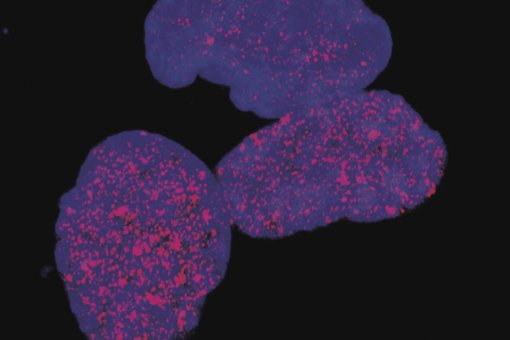Images
Participants


Contact

The study describes the neuroprotective effect of reelin in neurodegenerative diseases.
Co-directed by Eduardo Soriano and Lluís Pujadas, from the University of Barcelona, and the CIBERNED network, the study has involved Bernat Serra-Vidal, Ernest Giralt and Natàlia Carulla, all three scientists at IRB.
The scientists Eduardo Soriano and Lluís Pujadas, from the University of Barcelona (UB), and the “Centro de Investigación Biomédica en Red sobre Enfermedades Neurodegenerativas" (CIBERNED) have led research into the role of reelin in animal models of Alzheimer’s disease.
Published today in the journal Nature Communications, the study demonstrates how an increase in the levels of reelin—a protein that is essential for cerebral cortex plasticity—has the capacity to restore cognitive capacity in mouse models of Alzheimer’s disease, delaying amyloid-beta (Αβ) fibril formation in vitro and reducing the accumulation of amyloid deposits in the brains of animals affected by this disease.
The study, which was started four years ago, has involved the collaboration of members of the Peptides and Proteins lab at the Institute for Research in Biomedicine (IRB), namely Bernat Serra-Vidal, PhD student, Ernest Giralt, group leader, and Natàlia Carulla, associate researcher whose investigation focuses on the aggregation of Αβ. Alzheimer’s disease, which affects approximately 500,000 people in Spain, is characterised by the loss of neural connections and by neuronal death, both associated mainly with the formation of senile plaques (extracellular deposits of Aβ) and the presence of neurofibrillary tangles (intracellular deposits of tau protein.
In the IRB lab, researchers have performed experiments in vitro to determine whether there is an interaction between Aβ aggregation and reelin. These assays have revealed that reelin interacts with the Aβ peptide, delaying the formation of Aβ fibrils until it is trapped within them. “When reelins becomes trapped in Aβ fibrils, it loses its capacity to strengthen synaptic plasticity. This explains why an increase in reelin expression in the brain may be beneficial,” explain the authors of the study.
The hypotheses from the work in vitro have been tested in vivo using experimental animals. This study is the first to demonstrate a neuroprotective effect of reelin in neurodegenerative disease and, in addition, offers a possible explanation for this protective role.
The study has also involved scientists from the CIEN Foundation, the Vall d'Hebron Institut de Recerca (VHIR) and the University Pompeu Fabra (UPF). It forms part of the doctoral thesis of Daniela Rossi (UB and CIBERNED), principal co-author of the paper together with Lluís Pujadas.
More information on the website of the University of Barcelona and on the CIBERNED website
Related information:
Barcelona Biomed Conference on Alzheimer's Disease (July 9-11, 2014)
Reference article:
Reelin delays amyloid-beta fibril formation and rescues cognitive deficits in a model of Alzheimer’s disease
Lluís Pujadas, Daniela Rossi, Rosa Andrés, Cátia M. Teixeira, Bernat Serra-Vidal, Antoni Parcerisas, Rafael Maldonado, Ernest Giralt, Natàlia Carulla & Eduardo Soriano
Nature Communications (2014) doi: 10.1038/ncomms4443
About IRB Barcelona
The Institute for Research in Biomedicine (IRB Barcelona) pursues a society free of disease. To this end, it conducts multidisciplinary research of excellence to cure cancer and other diseases linked to ageing. It establishes technology transfer agreements with the pharmaceutical industry and major hospitals to bring research results closer to society, and organises a range of science outreach activities to engage the public in an open dialogue. IRB Barcelona is an international centre that hosts 400 researchers and more than 30 nationalities. Recognised as a Severo Ochoa Centre of Excellence since 2011, IRB Barcelona is a CERCA centre and member of the Barcelona Institute of Science and Technology (BIST).






